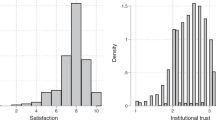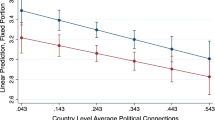Perceived Corruption and Individuals’ Life Satisfaction: The Mediating Role of Institutional Trust

Corruption degrades the quality of institutions, increases economic inequality and limits growth. Recent studies indicate that corruption is also associated with lower satisfaction with life. This research examines a potential explanation for this association and investigates the role of institutional trust in mediating the linkage between perceived corruption and satisfaction with life. Specifically, in two studies, we tested the novel hypothesises that perceived corruption affects life satisfaction indirectly by undermining individuals’ confidence in institutions. Study 1 (N = 251) involved an opportunity sample from the US. Study 2 (N = 9508) analysed data from the World Value Survey and involved a larger, representative sample of individuals from the MENA region. Across studies, mediation analyses provided evidence for the hypothesized indirect effect of perceived corruption on life satisfaction through institutional trust. Implications of the findings, limitations of the studies and directions for future research are discussed.
This is a preview of subscription content, log in via an institution to check access.
Access this article
Subscribe and save
Springer+ Basic
€32.70 /Month
- Get 10 units per month
- Download Article/Chapter or eBook
- 1 Unit = 1 Article or 1 Chapter
- Cancel anytime
Buy Now
Price includes VAT (France)
Instant access to the full article PDF.
Rent this article via DeepDyve

How Trust Makes a Difference: The Impact of the First Wave of the COVID-19 Pandemic on Life Satisfaction in Germany
Article Open access 02 August 2021

Corruption and Life Satisfaction in Transition: Is Corruption a Social Norm in Eastern Europe?
Article Open access 02 June 2020
Life Satisfaction and Confidence in National Institutions: Evidence from South America
Article Open access 06 April 2018
Notes
To run analyses with software other than SPSS (Wilson et al. 2014), data from study 1 are available from the corresponding author upon request, whereas data from study 2 are available online at http://www.worldvaluessurvey.org/wvs.jsp. Full annotation tables and SPSS scripts are available upon request. For more details about the PROCESS macro see: http://www.processmacro.org/index.html.
As a further check, we also tested the statistical significance of the indirect effect of institutional trust using the Sobel test (1982), obtaining the same results [b = −.14, SE = .044, z = −3.53, p = .004].
The Sobel test provided equivalent results, b = −.02, SE = .002, z = −10.08, p < .001.
References
- Abrams, D., & Travaglino, G. A. (2018). Immigration, political trust, and Brexit-Testing an aversion amplification hypothesis. British Journal of Social Psychology. https://doi.org/10.1111/bjso.12233. ArticleGoogle Scholar
- Akçay, S. (2006). Corruption and human development. Cato Journal,26(1), 29–48. Google Scholar
- Anderson, C. J., & Singer, M. M. (2008). The sensitive left and the impervious right: multilevel models and the politics of inequality, ideology, and legitimacy in Europe. Comparative Political Studies,41(4–5), 564–599. ArticleGoogle Scholar
- Anderson, C. J., & Tverdova, Y. V. (2003). Corruption, political allegiances, and attitudes toward government in contemporary democracies. American Journal of Political Science,47(1), 91–109. ArticleGoogle Scholar
- Bjørnskov, C. (2003). The happy few: cross-country evidence on social capital and life satisfaction. Kyklos,56(1), 3–16. ArticleGoogle Scholar
- Bjørnskov, C. (2006). The multiple facets of social capital. European Journal of Political Economy,22(1), 22–40. ArticleGoogle Scholar
- Bjørnskov, C., Dreher, A., & Fischer, J. A. (2008). Cross-country determinants of life satisfaction: exploring different determinants across groups in society. Social Choice and Welfare,30(1), 119–173. ArticleGoogle Scholar
- Chang, E. C., & Chu, Y. H. (2006). Corruption and trust: exceptionalism in Asian democracies? The Journal of Politics,68(2), 259–271. ArticleGoogle Scholar
- Clausen, B., Kraay, A., & Nyiri, Z. (2011). Corruption and confidence in public institutions: Evidence from a global survey. The World Bank Economic Review,25(2), 212–249. ArticleGoogle Scholar
- Coleman, J. S. (1988). Social capital in the creation of human capital. American Journal of Sociology,94, S95–S120. ArticleGoogle Scholar
- Diener, E. D., Emmons, R. A., Larsen, R. J., & Griffin, S. (1985). The satisfaction with life scale. Journal of Personality Assessment,49(1), 71–75. ArticleGoogle Scholar
- Diener, E., Oishi, S., & Lucas, R. E. (2003). Personality, culture, and subjective well-being: Emotional and cognitive evaluations of life. Annual Review of Psychology,54(1), 403–425. ArticleGoogle Scholar
- Frey, B. S., & Stutzer, A. (2000). Happiness, economy and institutions. The Economic Journal,110(466), 918–938. ArticleGoogle Scholar
- Frey, B. S., & Stutzer, A. (2002). What can economists learn from happiness research? Journal of Economic Literature,40(2), 402–435. ArticleGoogle Scholar
- Fukuyama, F. (1995). Social capital and the global economy. Foreign Affairs,74(5), 89–103. ArticleGoogle Scholar
- Hakhverdian, A., & Mayne, Q. (2012). Institutional trust, education, and corruption: A micro-macro interactive approach. The Journal of Politics,74(3), 739–750. ArticleGoogle Scholar
- Hayes, A. F. (2013). Introduction to mediation, moderation, and conditional process analysis: A regression- based approach. New York: Guilford Press. Google Scholar
- Helliwell, J. F. (2006). Well-being, social capital, and public sector: What’s new? Economic Journal,116(510), C34–C45. ArticleGoogle Scholar
- Helliwell, J. F. (2008). Life satisfaction and quality of development. NBER working papers, No. w14507. National Bureau of Economic Research. Retrieved http://www.nber.org/papers/w14507.
- Hudson, J. (2006). Institutional trust and subjective well-being across the EU. Kyklos,59(1), 43–62. ArticleGoogle Scholar
- Kaufmann, D., & Wei, S. J. (1999). Does “grease money” speed up the wheels of commerce? NBER working papers, No. w7093. National Bureau of Economic Research. Retrieved http://www.nber.org/papers/w7093.pdf.
- Klingemann, H. D. (1999). Mapping political support in the 1990s: A global analysis. In P. Norris (Ed.), Critical citizens: global support for democratic government (pp. 31–56). Oxford: Oxford University Press. ChapterGoogle Scholar
- Ko, K., & Samajdar, A. (2010). Evaluation of international corruption indexes: Should we believe them or not? The Social Science Journal,47(3), 508–540. ArticleGoogle Scholar
- Ko, K., & Weng, C. (2011). Critical review of conceptual definitions of Chinese corruption: A formal–legal perspective. Journal of Contemporary China,20(70), 359–378. ArticleGoogle Scholar
- Kostadinova, T. (2009). Abstain or rebel: Corruption perceptions and voting in East European elections. Politics & Policy,37(4), 691–714. ArticleGoogle Scholar
- Kotzian, P. (2011). Public support for liberal democracy. International Political Science Review,32(1), 23–41. ArticleGoogle Scholar
- Kubbe, I. (2013). Corruption and trust: A model design. Zeitschrift für Vergleichende Politikwissenschaft,7(1), 117–135. ArticleGoogle Scholar
- Lancaster, T. D., & Montinola, G. R. (2001). Comparative political corruption: Issues of operationalization and measurement. Studies in Comparative International Development,36(3), 3–28. ArticleGoogle Scholar
- Leff, N. H. (1964). Economic development through bureaucratic corruption. American Behavioral Scientist,8(3), 8–14. ArticleGoogle Scholar
- Leung, A., Kier, C., Fung, T., Fung, L., & Sproule, R. (2011). Searching for happiness: The importance of social capital. Journal of Happiness Studies,12(3), 443–462. ArticleGoogle Scholar
- Levi, M., & Stoker, L. (2000). Political trust and trustworthiness. Annual Review of Political Science,3(1), 475–507. ArticleGoogle Scholar
- Li, H., Gong, T., & Xiao, H. (2016). The perception of anti-corruption efficacy in China: An empirical analysis. Social Indicator Research,125(3), 885–903. https://doi.org/10.1007/s11205-015-0859-z. ArticleGoogle Scholar
- MacKinnon, D. P., Lockwood, C. M., Hoffman, J. M., West, S. G., & Sheets, V. (2002). A comparison of methods to test mediation and other intervening variable effects. Psychological Methods,7(1), 83–104. ArticleGoogle Scholar
- Mishler, W., & Rose, R. (2001). What are the origins of political trust? Testing institutional and cultural theories in post-communist societies. Comparative Political Studies,34(1), 30–62. ArticleGoogle Scholar
- Montes, G. C., & Paschoal, P. C. (2016). Corruption: what are the effects on government effectiveness? Empirical evidence considering developed and developing countries. Applied Economics Letters,23(2), 146–150. ArticleGoogle Scholar
- Montinola, G. R., & Jackman, R. W. (2002). Sources of corruption: a cross-country study. British Journal of Political Science,32(01), 147–170. ArticleGoogle Scholar
- Morris, S. D., & Klesner, J. L. (2010). Corruption and trust: Theoretical considerations and evidence from Mexico. Comparative Political Studies,43(10), 1258–1285. ArticleGoogle Scholar
- Murphy, K. M., Shleifer, A., & Vishny, R. W. (1993). Why is rent-seeking so costly to growth? The American Economic Review,83(2), 409–414. Google Scholar
- Pavot, W., & Diener, E. (2008). The satisfaction with life scale and the emerging construct of life satisfaction. The Journal of Positive Psychology,3(2), 137–152. ArticleGoogle Scholar
- Pellegata, A., & Memoli, V. (2016). Can corruption erode confidence in political institutions among European countries? Comparing the effects of different measures of perceived corruption. Social Indicators Research,128(1), 391–412. ArticleGoogle Scholar
- Pretty, J., & Ward, H. (2001). Social capital and the environment. World Development,29(2), 209–227. ArticleGoogle Scholar
- Putnam, R. D. (1993). Making democracy work, with Robert Leonardi and Raffaella Y. Nanetti. Princeton, NJ: Princeton University Press. Google Scholar
- Rose-Ackerman, S. (1999). Corruption and government: causes, consequences, and reform. Cambridge: Cambridge University Press. BookGoogle Scholar
- Rothstein, B. (2010). Happiness and the welfare state. Social Research: An International Quarterly,77(2), 441–468. Google Scholar
- Rothstein, B., & Stolle, D. (2008). The state and social capital: An institutional theory of generalized trust. Comparative Politics, 40(4), 441–459. Retrieved http://www.jstor.org/stable/20434095.
- Ryan, R. M., & Deci, E. L. (2001). On happiness and human potentials: A review of research on hedonic and eudaimonic well-being. Annual Review of Psychology,52(1), 141–166. ArticleGoogle Scholar
- Seligson, M. A. (2002). The impact of corruption on regime legitimacy: A comparative study of four Latin American countries. The Journal of Politics,64(2), 408–433. ArticleGoogle Scholar
- Sobel, M. E. (1982). Asymptotic confidence intervals for indirect effects in structural equation models. In S. Leinhart (Ed.), Sociological methodology (pp. 290–312). San Francisco: Jossey-Bass. Google Scholar
- Tan, X., Liu, L., Huang, Z., Zhao, X., & Zheng, W. (2016). The dampening effect of social dominance orientation on awareness of corruption: Moral outrage as a mediator. Social Indicators Research,125(1), 89–102. ArticleGoogle Scholar
- Tavits, M. (2008). Representation, corruption, and subjective well-being. Comparative Political Studies,41(12), 1607–1630. ArticleGoogle Scholar
- Uslaner, E. M. (2003). Trust and civic engagement in East and West. In G. Badescu & E. Uslaner (Eds.), Social capital and the transition to democracy (pp. 81–94). London: Routledge. Google Scholar
- Uslaner, E. M. (2008). Corruption, inequality, and the rule of law: the bulging pocket makes the easy life. Cambridge: Cambridge University Press. BookGoogle Scholar
- Voliotis, S. (2011). Abuse of ministerial authority, systemic perjury, and obstruction of justice: corruption in the shadows of organizational practice. Journal of Business Ethics,102(4), 537–562. ArticleGoogle Scholar
- Wallace, C., & Latcheva, R. (2006). Economic transformation outside the law: corruption, trust in public institutions and the informal economy in transition countries of Central and Eastern Europe. Europe–Asia Studies,58(1), 81–102. ArticleGoogle Scholar
- Warren, M. (2004). What does corruption mean in a democracy? American Journal of Political Science,48(2), 328–343. ArticleGoogle Scholar
- Welsch, H. (2008). The welfare costs of corruption. Applied Economics,40(14), 1839–1849. ArticleGoogle Scholar
- Wilson, G., Aruliah, D. A., Brown, C. T., Chue Hong, N. P., Davis, M., Guy, R. T., et al. (2014). Best practices for scientific computing. PLoS Biology,12(1), e1001745. https://doi.org/10.1371/journal.pbio.1001745. ArticleGoogle Scholar
- Wu, Y., & Zhu, J. (2016). When are people unhappy? Corruption experience, environment, and life satisfaction in Mainland China. Journal of Happiness Studies,17(3), 1125–1147. ArticleGoogle Scholar
- Zheng, W. W., Liu, L., Huang, Z. W., & Tan, X. Y. (2016). Life Satisfaction as a buffer of the relationship between corruption perception and political participation. Social Indicators Research. https://doi.org/10.1007/s11205-016-1318-1. ArticleGoogle Scholar
Author information
- Marco Ciziceno and Giovanni A. Travaglino have contributed equally to this work.
Authors and Affiliations
- Department of Economic Sciences, University of Palermo, Palermo, Italy Marco Ciziceno
- Centre for the Study of Group Processes, School of Psychology, University of Kent, Canterbury, UK Giovanni A. Travaglino
- School of Humanities and Social Science, The Chinese University of Hong Kong, Shenzhen, China Giovanni A. Travaglino
- Marco Ciziceno



